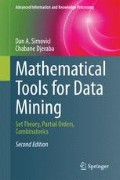Abstract
Combinatorics is the area of mathematics concerned with counting collections of mathematical objects. We begin by discussing several elementary combinatorial issues such as permutations, the power set of a finite sets, the inclusion-exclusion principle, and continue with more involved combinatorial techniques that are relevant for data mining, such as the combinatorics of locally finite posets, Ramsey’s Theorem, various combinatorial properties of collection of sets.
Access this chapter
Tax calculation will be finalised at checkout
Purchases are for personal use only
References
R.P. Stanley, Enumerative Combinatorics, vol. 1 (Cambridge University Press, Cambridge, 1997)
D. Lubell, A short proof of Sperner theorem. J. Comb. Theory 1, 299 (1966)
K. Yamamoto, Logarithmic order of free distributive lattices. J. Math. Soc. Japan 6, 343–353 (1954)
L.D. Meshalkin, A generalization of Sperner’s theorem on the number of subsets of a finite set. Theory Probab. Appl. 8, 203–204 (1963). (in Russian)
E. Sperner, Ein Satz über Untermengen einer endlichen Menge. Math. Z. 27, 544–548 (1928)
V.N. Vapnik, A.Y. Chervonenkis, On the uniform convergence of relative frequencies of events to their probabilities. Theory Probab. Appl. 16, 264–280 (1971)
N. Sauer, On the density of families of sets. J. Comb. Theory (A) 13, 145–147 (1972)
A. Blumer, A. Ehrenfeucht, D. Haussler, M. Warmuth, Learnability and the Vapnik-Chervonenkis dimension. J. ACM 36, 929–965 (1989)
R.M. Dudley, Uniform Central Limit Theorems (Cambridge University Press, Cambridge, 1999)
D. Pollard, Empirical Processes: Theory and Applications (Institute of Mathematical Statistics, Hayward, CA, 1990)
A. Björklund, T. Husfeldt, Inclusion-exclusion algorithms for counting set partitions, Proceedings of the 47th Annual IEEE Symposium on Foundations of Computer Science, Berkeley, CA (IEEE Computer Society Press, Los Alamitos, CA, 2006), pp. 575–582
J. Marica, J. Schönheim, Differences of sets and a problem of Graham. Can. Math. Bulletin 12, 635–637 (1969)
T. Calders. Axiomatization and deduction rules for the frequency of item sets. PhD thesis, Universiteit Antwerpen, 2003.
R.P. Stanley, Enumerative Combinatorics, vol. 2 (Cambridge University Press, Cambridge, 1999)
R.L. Graham, D.E. Knuth, O. Patashnick, Concrete Mathematics—A Foundation for Computer Science (Addison-Wesley, Reading, MA, 1989)
M. Vidyasagar, Learning and Generalization with Applications to Neural Networks (Springer, London, 2003)
R.S. Wenocur, R.M. Dudley, Some special Vapnik-Chervonenkis classes. Discrete Math. 33, 313–318 (1981)
P. Assouad, Densité et dimension. Annales de l’Institut Fourier 33, 233–282 (1983)
M. Ledoux, M. Talagrand, Isoperimetry and Processes in Probability in Banach Spaces (Springer, Berlin, 2002)
G.-C. Rota, The number of partitions of a set. Am. Math. Monthly 71, 498–504 (1964)
Author information
Authors and Affiliations
Corresponding author
Rights and permissions
Copyright information
© 2014 Springer-Verlag London
About this chapter
Cite this chapter
Simovici, D.A., Djeraba, C. (2014). Combinatorics. In: Mathematical Tools for Data Mining. Advanced Information and Knowledge Processing. Springer, London. https://doi.org/10.1007/978-1-4471-6407-4_3
Download citation
DOI: https://doi.org/10.1007/978-1-4471-6407-4_3
Published:
Publisher Name: Springer, London
Print ISBN: 978-1-4471-6406-7
Online ISBN: 978-1-4471-6407-4
eBook Packages: Computer ScienceComputer Science (R0)

